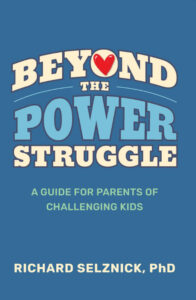 Since my latest book, Beyond the Power Struggle: A Guide to Challenging Kids, was published some months ago, I have had some interesting interactions – a number of different interviews and parents contacting me about their kid’s behavior.
Since my latest book, Beyond the Power Struggle: A Guide to Challenging Kids, was published some months ago, I have had some interesting interactions – a number of different interviews and parents contacting me about their kid’s behavior.
A nice surprise was a small group of parents, let’s call it a parent book club, who formed to dish about the concepts related to my book.
As we talked about different ways of handling challenging behavior, one of the dads asked about how he should have handled his four-year-old son pouring milk over the furniture (not accidentally).
We speculated how their grandparents’ generation would have handled it. (One clue. Their grandparents would not have been dwelling over the psychological variables behind the child’s behavior.)
One approach to the milk crime would be to employ the often used (overused?) strategy of “time-out.”
To my ears, that approach would have little real impact on the child, as he would likely be kicking, screaming and raging while being marched off to time-out with little learning taking place.
Underneath many child behaviors, I believe most kids suffer from a syndrome I have come to call IWWIWD or “I Want What I Want Disorder.”
What did this four-year-old milk pourer want? Probably a combination of “This will be fun to see how far I can go,” coupled with an immediate demand soon after to play with a screen – some kiddie iPad or its equivalent.
Some might write off the behavior under the category of “Well, he’s a four-year-old boy and that’s what they do,” effectively brushing it off.
Well, I wrote the book. I should have an answer, right? Here’s my answer.
I think there are “kid crimes” that call for an action and misdemeanors that can be brushed off. I wouldn’t brush it off.
If I were able to keep my wits about me (not easy to do in this situation), I like removing the child from the situation as quickly as possible. Then speaking in clear and firm terms I’d say something like the following:
“That was not cute and I am very upset with you. You know that’s not how to behave in the house. We were going to go out and have fun, but now I’m too angry to go anywhere. For now, there is absolutely no screen playing or TV watching. I will check back with you later.” Then I’d walk out and be a bit chilly. Maybe an hour or so later I’d warm up by degrees. I made my point.
Some may disagree, but this approach has its value. No yelling. No time-out. An effective and clear statement of anger from the parent with the linking up screen use as an earned privilege. I would predict future desires to spill milk might be filed away somewhere in boy-brain as not a wise thing to do.
In another story brought to me beyond the group, Marcus, age 13, was being tutored in a public library. Marcus knew the tutor well, having worked with her for a number of years. When asked to do a writing exercise, Marcus had a 13-year-old version of a five-year-old meltdown. It was quite a scene in the public library.
Mom, sitting close by was understandably mortified, later telling me Marcus’ behavior was “reprehensible.”
How did mom handle it? Again, she didn’t use time out or other such low impact consequence. Instead, she drove home in stony (chilly) silence, not speaking to Marcus. There were no lectures or harangues. Thinking about what a waste of time and money that tutoring session was and how embarrassed she felt, this is what the mom did:
Once inside, mom said to Marcus, “I know you were saving your Christmas money for something with your game system, but that session wasted time and a lot of money. You owe me Please go into your room and pay me back the $65 for that session of embarrassment.”
Ouch!!! Elegant and to the point. It certainly made a statement to Marcus that is likely to stick.
Takeaway Point
It’s not too early or too late to make an impactful statement.
Feel free to make comment below.
To receive future blog posts, register your email: https://shutdownlearner.com.
To Contact Dr. Richard Selznick for advice, consultation or other information, email: shutdownlearner1@gmail.com.

 Copyright, Richard Selznick, Ph.D. 2023, www.shutdownlearner.com.
Copyright, Richard Selznick, Ph.D. 2023, www.shutdownlearner.com.
